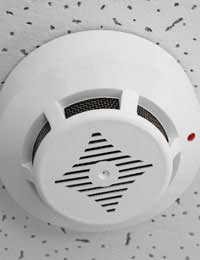The Importance of Establishing Home Alerts For Deaf People

Home alerts are vital tools for deaf people to have. From the mundane to the lifesaving home alerts are all around us, all of the time. The difference is, that for most of us, these home alerts are noises and therefore we do not need to do anything special to make sure they do their job and alert us. For deaf and hard of hearing people, such alerts are useless. That is why a system of different home alerts has been developed for people who need them.
Smoke and Fire Detectors
Smoke and fire detectors are the truly lifesaving home alerts which are used. Time and time again it is proven that people with smoke alarms are less likely to die in a fire. Thus, it follows that there needs to be a way of making sure deaf people have these home alerts too. One of the most common smoke or fire detection systems for deaf people uses a strobe rather than a piercing noise. By using a strobe rather than a normal flashing light, the alarm should wake people up if they are asleep, which a normal light would not to. In addition, because it flashes around the whole room, you will see a strobe even if you are not facing the detector.Another common method of smoke or fire detection is to buy a system which emits a signal to a receiver. This receiver is carried around and vibrates when a signal is received, alerting the person to the presence of fire or smoke. Whichever method is chosen, take safety advice over it and make sure it is powerful enough to wake you in the event of a fire.
Doorbells and Phones
Far less vital in terms of saving lives but important enough for daily life, are doorbells and phones. Phones are the easier one to deal with because they are so portable. As mobile phones have shown, the vibrate setting is easy to use and will alert people to an incoming call or message. Home phones with a similar function can also be bought. Doorbells are less portable although one solution is to buy a remote bell which has the part of the bell which makes the sound as a portable device. Of course, it is not always as practical to carry it around as a phone, particularly if the range is not very long. In most cases, it may be better to have a system of lights rigged up in each room where you are likely to see them flash when someone rings the doorbell.Home alerts are one of those things which most of us who can hear take for granted. You just assume you will hear the smoke alarm go or the phone ring. But for people who do not hear well, it can literally be a matter of life or death and thus is vital they get correct systems installed. There are other home alerts too, things such as cooker timers, which can also be adapted using lights. Cooker timers in particular are important to get right - not just because of spoilt food but because of fire risks. On the whole, technology, things such as remote systems and vibrating phones, is making it a lot easier to have a wide range of options for home alerts.


Re: The Listening Bus
Hi, We would like to book the listening bus for our school community. What is your availability for the summer term 2025? What are the costs? We…
Re: Sign Supported English
Ex Mary hare school. Love sign supported English as Aspie. More useful Less emotional As words Not emotion More helpful to deaf Aspies
Re: The Listening Bus
Hi, I am the inclusion leader and SENCo of a school with a specialist resource provision for deaf pupils within a mainstream school. Staff say…
Re: The British Sign Language Broadcasting Trust
I’m not effected in any way or suffer from any communication issues personally. I was curious as to why…
Re: Sign Supported English
I want a series of videos to learn SIGN SUPPORTED ENGLISH FOR BEGINNERS. Can you please help?
Re: Makaton
Hello We are a small pre-school and we are trying to teach all our children Makaton to help all of them communicate regardless of their own…
Re: Sign Supported English
Can anyone help me ? I am trying to find an SSE class or lessons in Kent and have had no luck. Failing that, are there any publications I…
Re: Hands on Signing
Hi I have a blind child and he has a moderate hearing loss. I wonder if you can help me to teach him sign language and I need to learn as well.…
Re: Sign Supported English
Does anyone know of any programmes or resources for using SSE with older people whose hearing has deteriorated in later life?
Re: Makaton
what is makaton??????????????????????????